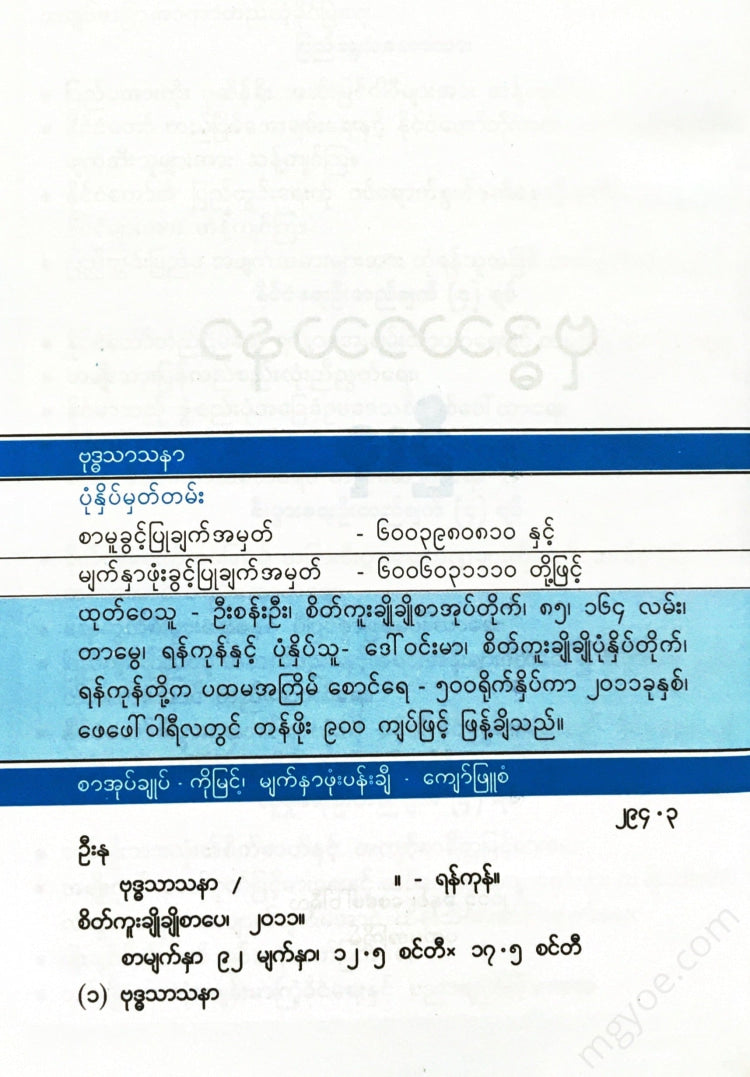စိတ်ကူးချိုချိုစာပေ
U Nu - Buddhism
U Nu - Buddhism
Couldn't load pickup availability
About the Buddha
Please come and join us, gentlemen.
Today I want to talk about God. When talking about God, I think it's important to first give a brief background so that the audience can understand it more easily.
Various animals
In addition to the humans and animals that we can see with our eyes, there are many other creatures in the world. If we had to describe the creatures in the world by type, they would be:
(1) Brahmas, life
(2) Spirits, etc.
(3) People,
(4) Animals,
(5) The gods,
(6) Asuras,
(7) They are hellish people, children of hell.
These beings become various beings and when the time comes, they die. After death, they do not disappear. Brahmas die and become devas. They become humans. When they die as devas, they become animals, demons, asuras, and hell dwellers. Similarly, when devas, humans, animals, demons, asuras, and hell dwellers die, according to the merits and demerits they have done, as I have just said, they become one of the Brahmas, devas, humans, animals, demons, asuras, and hell dwellers. They cannot help but become again.
Such Brahmas, devas, humans, animals, demons, ghosts, and hell dwellers are reborn again and again, and they are constantly aging, getting sick, and dying, which is a very terrible suffering.
Because beings heard the Dhamma that could free them from these sufferings only when a Buddha appeared, and they tried to follow it, many Brahmas, devas, and humans were freed from the sufferings of aging, sickness, and death, never to be reborn again after death. This Dhamma also disappeared after a long time after the Buddha entered Nibbana. It will only reappear when another Buddha appears.
That is why good people make a vow to become Buddhas with the intention of saving these beings from suffering. Just making that vow does not make one a Buddha. One has to make many lifetimes of effort to become a Buddha by making this vow. For example... a person who wants to save people who are suffering from diseases and wants to be compassionate would first make a vow to become a doctor. Just making that vow does not make one a doctor; one would have to spend many years practicing medicine to become a doctor.
10 virtues
There are ten major tasks that people who pray to become Buddhas must do. These major tasks are called parami in Pali. Parami is the task that must be done to become Buddhas. These major tasks are:
(1) The virtue of giving generously, from one's property, children, wife, and even one's life.
(2) The virtue of taking special care not to do or say wrong with one's body and mouth.
(3) Before the attainment of nirvana, which is the renunciation of sensual pleasures.
(4) The wisdom of acquiring knowledge that can bring happiness to sentient beings and making them happy.
(5) The virtue of effort, which is to exert oneself extremely hard for the welfare of beings.
(6) The virtue of patience, which is special patience in every place.
(7) The virtue of loyalty , which means keeping promises made, regardless of life or death.
(8) When you have made a vow to do something, you do it without hesitation, even if it means dying.
(9) The virtue of loving-kindness , which is to have a loving mind towards all beings, regardless of their inferiority, middle class, or superior status.
(10) The virtue of equanimity, which is maintaining oneself so that one is not discouraged or discouraged when one's desires are fulfilled, as well as when they are not.
These ten great virtues are divided into three categories: low-level, medium-level, and high-level.
It is not easy to achieve 100% success in all three. It cannot be achieved in one lifetime. It cannot be achieved in a hundred or a thousand lifetimes. Only through countless lifetimes of effort can one achieve 100% success in these ten great undertakings.
Bodhisattva Monkey King
To make it easier to understand the ten virtues, I would like to tell you an incident from the life of the Bodhisattva Monkey King. A brahmin named Devadatta was searching for a lost cow when he lost his way in the forest and fell into a ravine. The Bodhisattva Monkey King saw the brahmin falling into the ravine.
(1) Seeing this Brahmin in such a state of death, the Monkey King Buddha thought of his son.
Seeing him falling into the abyss, a feeling of compassion and love, a desire to see him happy, arose. (2) Then the Bodhisattva promised to save the Brahmin's life at the cost of his own. He saved him as promised. I will tell you how he saved him.
(3) After the Bodhisattva made a promise to the Brahmin, the monkey king began to think about how to rescue him from the cliff. When he thought about it, he came up with the idea of jumping over the cliff to save the Brahmin.





